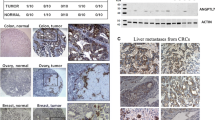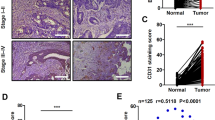Abstract
Tumor angiogenesis is of paramount importance in solid tumor development. Elevated serum levels of YKL-40, which is a secreted heparin-binding glycoprotein, have been associated with a worse prognosis from various advanced human cancers. Yet the role of YKL-40 activity in these cancers is still missing. In this study, we showed that ectopic expression of YKL-40 in MDA-MB-231 breast cancer cells and in HCT-116 colon cancer cells led to larger tumor formation with an extensive angiogenic phenotype than did control cancer cells in mice. Affinity-purified recombinant YKL-40 protein promoted vascular endothelial cell angiogenesis in vitro, the effects of which are similar to the activities observed using MDA-MB-231 and HCT-116 cell-conditioned medium after transfection with YKL-40. Furthermore, YKL-40 was found to induce coordination of membrane-bound receptor syndecan-1 and integrin αvβ3 and to activate an intracellular signaling cascade, including focal adhesion kinase and mitogen-activated protein kinase extracellular signal-related kinase1/2 in endothelial cells. Moreover, blockade of YKL-40 using small-interfering RNA gene knockdown suppressed tumor angiogenesis in vitro and in vivo. Immunohistochemical analysis of human breast cancer showed a correlation between YKL-40 expression and blood vessel density. These findings provide novel insights into angiogenic activities and molecular mechanisms of YKL-40 in cancer development.







Similar content being viewed by others
References
Albini A, Benelli R, Presta M, Rusnati M, Ziche M, Rubartelli A et al. (1996). HIV-tat protein is a heparin-binding angiogenic growth factor. Oncogene 12: 289–297.
Beauvais DM, Burbach BJ, Rapraeger AC . (2004). The syndecan-1 ectodomain regulates alphavbeta3 integrin activity in human mammary carcinoma cells. J Cell Biol 167: 171–181.
Beauvais DM, Rapraeger AC . (2003). Syndecan-1-mediated cell spreading requires signaling by alphavbeta3 integrins in human breast carcinoma cells. Exp Cell Res 286: 219–232.
Bergmann OJ, Johansen JS, Klausen TW, Mylin AK, Kristensen JS, Kjeldsen E et al. (2005). High serum concentration of YKL-40 is associated with short survival in patients with acute myeloid leukemia. Clin Cancer Res 11: 8644–8652.
Bernfield M, Gotte M, Park PW, Reizes O, Fitzgerald ML, Lincecum J et al. (1999). Functions of cell surface heparan sulfate proteoglycans. Annu Rev Biochem 68: 729–777.
Brasso K, Christensen IJ, Johansen JS, Teisner B, Garnero P, Price PA et al. (2006). Prognostic value of PINP, bone alkaline phosphatase, CTX-I, and YKL-40 in patients with metastatic prostate carcinoma. Prostate 66: 503–513.
Cintin C, Johansen JS, Christensen IJ, Price PA, Sorensen S, Nielsen HJ . (2002). High serum YKL-40 level after surgery for colorectal carcinoma is related to short survival. Cancer 95: 267–274.
Fahmy RG, Dass CR, Sun LQ, Chesterman CN, Khachigian LM . (2003). Transcription factor Egr-1 supports FGF-dependent angiogenesis during neovascularization and tumor growth. Nat Med 9: 1026–1032.
Fusetti F, Pijning T, Kalk KH, Bos E, Dijkstra BW . (2003). Crystal structure and carbohydrate-binding properties of the human cartilage glycoprotein-39. J Biol Chem 278: 37753–37760.
Hakala BE, White C, Recklies AD . (1993). Human cartilage gp-39, a major secretory product of articular chondrocytes and synovial cells, is a mammalian member of a chitinase protein family. J Biol Chem 268: 25803–25810.
Hanahan D, Folkman J . (1996). Patterns and emerging mechanisms of the angiogenic switch during tumorigenesis. Cell 86: 353–364.
Hanahan D, Weinberg RA . (2000). The hallmarks of cancer. Cell 100: 57–70.
Higashiyama S, Abraham JA, Miller J, Fiddes JC, Klagsbrun M . (1991). A heparin-binding growth factor secreted by macrophage-like cells that is related to EGF. Science 251: 936–939.
Hogdall EV, Johansen JS, Kjaer SK, Price PA, Christensen L, Blaakaer J et al. (2003). High plasma YKL-40 level in patients with ovarian cancer stage III is related to shorter survival. Oncol Rep 10: 1535–1538.
Hood JD, Frausto R, Kiosses WB, Schwartz MA, Cheresh DA . (2003). Differential alphav integrin-mediated Ras-ERK signaling during two pathways of angiogenesis. J Cell Biol 162: 933–943.
Hormigo A, Gu B, Karimi S, Riedel E, Panageas KS, Edgar MA et al. (2006). YKL-40 and matrix metalloproteinase-9 as potential serum biomarkers for patients with high-grade gliomas. Clin Cancer Res 12: 5698–5704.
Hu B, Trinh K, Figueira WF, Price PA . (1996). Isolation and sequence of a novel human chondrocyte protein related to mammalian members of the chitinase protein family. J Biol Chem 271: 19415–19420.
Jendraschak E, Sage EH . (1996). Regulation of angiogenesis by SPARC and angiostatin: implications for tumor cell biology. Semin Cancer Biol 7: 139–146.
Jensen BV, Johansen JS, Price PA . (2003). High levels of serum HER-2/neu and YKL-40 independently reflect aggressiveness of metastatic breast cancer. Clin Cancer Res 9: 4423–4434.
Johansen JS, Christoffersen P, Moller S, Price PA, Henriksen JH, Garbarsch C et al. (2000). Serum YKL-40 is increased in patients with hepatic fibrosis. J Hepatol 32: 911–920.
Johansen JS, Drivsholm L, Price PA, Christensen IJ . (2004). High serum YKL-40 level in patients with small cell lung cancer is related to early death. Lung Cancer 46: 333–340.
Johansen JS, Williamson MK, Rice JS, Price PA . (1992). Identification of proteins secreted by human osteoblastic cells in culture. J Bone Miner Res 7: 501–512.
Kim KJ, Li B, Winer J, Armanini M, Gillett N, Phillips HS et al. (1993). Inhibition of vascular endothelial growth factor-induced angiogenesis suppresses tumour growth in vivo. Nature 362: 841–844.
Kim SH, Das K, Noreen S, Coffman F, Hameed M . (2007). Prognostic implications of immunohistochemically detected YKL-40 expression in breast cancer. World J Surg Oncol 5: 17.
Lal A, Lash AE, Altschul SF, Velculescu V, Zhang L, McLendon RE et al. (1999). A public database for gene expression in human cancers. Cancer Res 59: 5403–5407.
Lau SH, Sham JS, Xie D, Tzang CH, Tang D, Ma N et al. (2006). Clusterin plays an important role in hepatocellular carcinoma metastasis. Oncogene 25: 1242–1250.
Maglione D, Guerriero V, Viglietto G, Ferraro MG, Aprelikova O, Alitalo K et al. (1993). Two alternative mRNAs coding for the angiogenic factor, placenta growth factor (PlGF), are transcribed from a single gene of chromosome 14. Oncogene 8: 925–931.
McQuade KJ, Beauvais DM, Burbach BJ, Rapraeger AC . (2006). Syndecan-1 regulates alphavbeta5 integrin activity in B82L fibroblasts. J Cell Sci 119: 2445–2456.
Millauer B, Longhi MP, Plate KH, Shawver LK, Risau W, Ullrich A et al. (1996). Dominant-negative inhibition of Flk-1 suppresses the growth of many tumor types in vivo. Cancer Res 56: 1615–1620.
Naruse T, Nishida Y, Hosono K, Ishiguro N . (2006). Meloxicam inhibits osteosarcoma growth, invasiveness and metastasis by COX-2-dependent and independent routes. Carcinogenesis 27: 584–592.
Nigro JM, Misra A, Zhang L, Smirnov I, Colman H, Griffin C et al. (2005). Integrated array-comparative genomic hybridization and expression array profiles identify clinically relevant molecular subtypes of glioblastoma. Cancer Res 65: 1678–1686.
Nyirkos P, Golds EE . (1990). Human synovial cells secrete a 39 kDa protein similar to a bovine mammary protein expressed during the non-lactating period. Biochem J 269: 265–268.
Pelloski CE, Mahajan A, Maor M, Chang EL, Woo S, Gilbert M et al. (2005). YKL-40 expression is associated with poorer response to radiation and shorter overall survival in glioblastoma. Clin Cancer Res 11: 3326–3334.
Polnaszek N, Kwabi-Addo B, Peterson LE, Ozen M, Greenberg NM, Ortega S et al. (2003). Fibroblast growth factor 2 promotes tumor progression in an autochthonous mouse model of prostate cancer. Cancer Res 63: 5754–5760.
Recklies AD, White C, Ling H . (2002). The chitinase 3-like protein human cartilage glycoprotein 39 (HC-gp39) stimulates proliferation of human connective-tissue cells and activates both extracellular signal-regulated kinase- and protein kinase B-mediated signalling pathways. Biochem J 365: 119–126.
Renkema GH, Boot RG, Au FL, Donker-Koopman WE, Strijland A, Muijsers AO et al. (1998). Chitotriosidase, a chitinase, and the 39-kDa human cartilage glycoprotein, a chitin-binding lectin, are homologues of family 18 glycosyl hydrolases secreted by human macrophages. Eur J Biochem 251: 504–509.
Roslind A, Knoop AS, Jensen MB, Johansen JS, Nielsen DL, Price PA et al. (2008). YKL-40 protein expression is not a prognostic marker in patients with primary breast cancer. Breast Cancer Res Treat 112: 275–285.
Schmidt H, Johansen JS, Gehl J, Geertsen PF, Fode K, von der Maase H . (2006). Elevated serum level of YKL-40 is an independent prognostic factor for poor survival in patients with metastatic melanoma [erratum appears in Cancer. 2006; 107(9 No. 1): 2315]. Cancer 106: 1130–1139.
Shackelton LM, Mann DM, Millis AJ . (1995). Identification of a 38-kDa heparin-binding glycoprotein (gp38k) in differentiating vascular smooth muscle cells as a member of a group of proteins associated with tissue remodeling. J Biol Chem 270: 13076–13083.
Sharif M, Granell R, Johansen J, Clarke S, Elson C, Kirwan JR . (2006). Serum cartilage oligomeric matrix protein and other biomarker profiles in tibiofemoral and patellofemoral osteoarthritis of the knee [see comment]. Rheumatology 45: 522–526.
Yan W, Bentley B, Shao R . (2008). Distinct angiogenic mediators are required for basic fibroblast growth factor- and vascular endothelial growth factor-induced angiogenesis: the role of cytoplasmic tyrosine kinase c-Abl in tumor angiogenesis. Mol Biol Cell 19: 2278–2288.
Yan W, Shao R . (2006). Transduction of a mesenchyme-specific gene periostin into 293T cells induces cell invasive activity through epithelial-mesenchymal transformation. J Biol Chem 281: 19700–19708.
Yancopoulos GD, Davis S, Gale NW, Rudge JS, Wiegand SJ, Holash J . (2000). Vascular-specific growth factors and blood vessel formation. Nature 407: 242–248.
Acknowledgements
We thank Drs A Schneyer, S Schneider and S Scully for their critical comments. This work was supported by NCI R01 CA120659 and DOD W81XWH-06-1-0563 (RS), Collaborative Biomedical Research Program, Baystate Medical Center/University of Massachusetts at Amherst (RS, QJC and RBA) and Rays of Hope, Baystate Medical Center (QJC and RS).
Author information
Authors and Affiliations
Corresponding author
Additional information
Supplementary Information accompanies the paper on the Oncogene website (http://www.nature.com/onc)
Supplementary information
Rights and permissions
About this article
Cite this article
Shao, R., Hamel, K., Petersen, L. et al. YKL-40, a secreted glycoprotein, promotes tumor angiogenesis. Oncogene 28, 4456–4468 (2009). https://doi.org/10.1038/onc.2009.292
Received:
Revised:
Accepted:
Published:
Issue Date:
DOI: https://doi.org/10.1038/onc.2009.292
- Springer Nature Limited
Keywords
This article is cited by
-
Evaluation of the Recombinant Bacterial Chitinases as Anti-proliferative and Anti-migratory Agents for the Human Breast Cancer Cell Line, MCF-7
Applied Biochemistry and Biotechnology (2024)
-
Extracellular matrix remodeling in tumor progression and immune escape: from mechanisms to treatments
Molecular Cancer (2023)
-
CD146 as a promising therapeutic target for retinal and choroidal neovascularization diseases
Science China Life Sciences (2022)
-
Inflammatory profile of induced sputum composition in systemic sclerosis and comparison with healthy volunteers
Scientific Reports (2021)
-
Chitinase-3 like-protein-1 function and its role in diseases
Signal Transduction and Targeted Therapy (2020)




